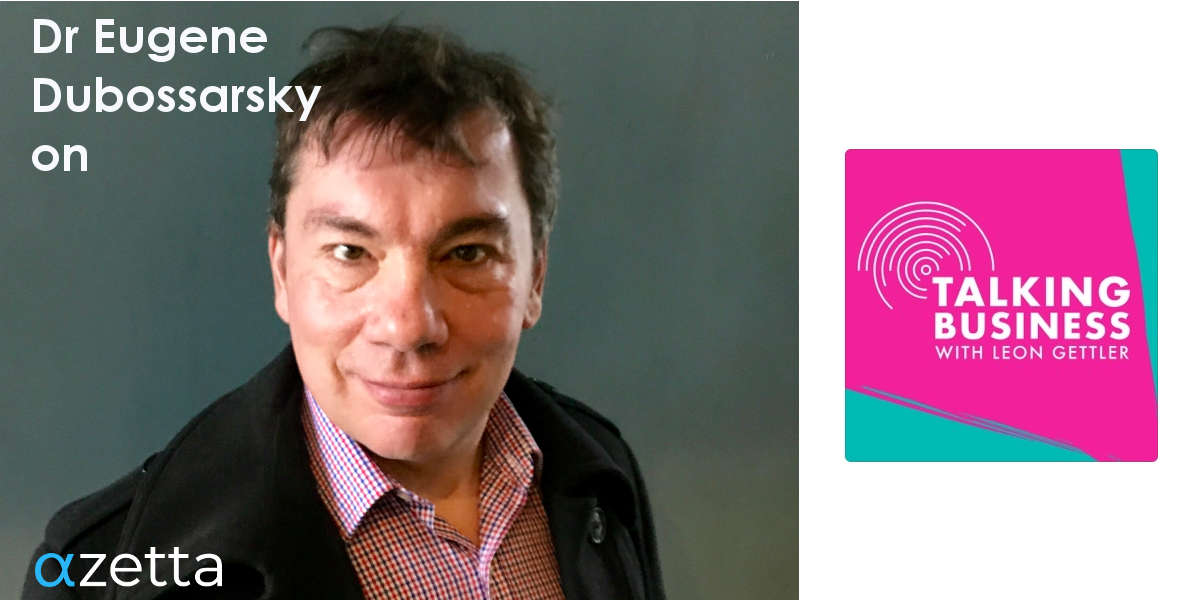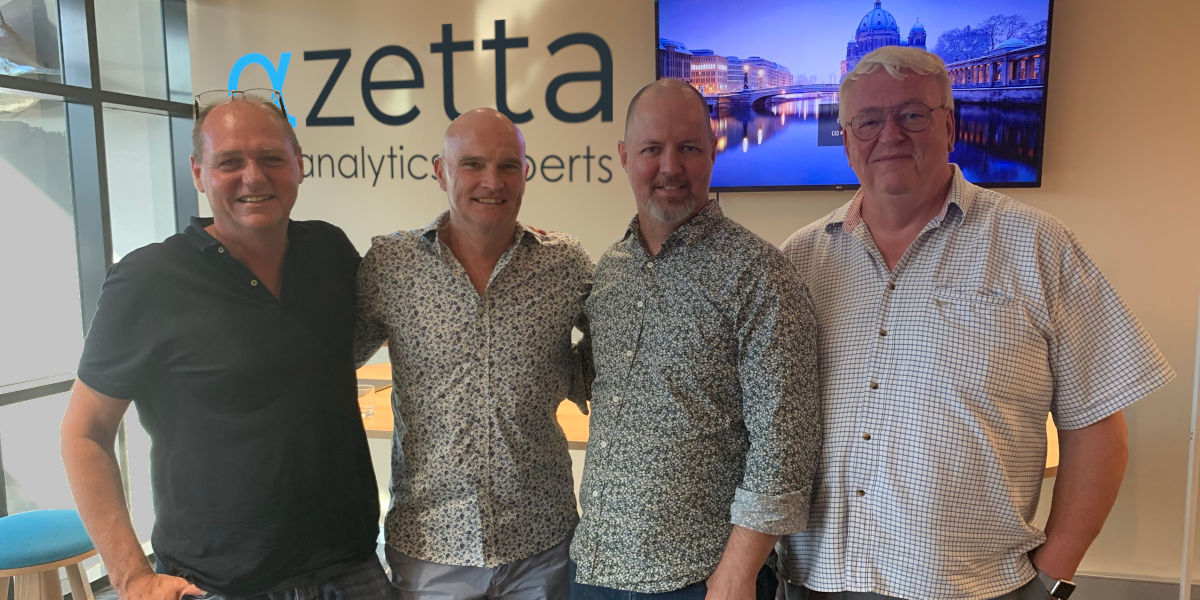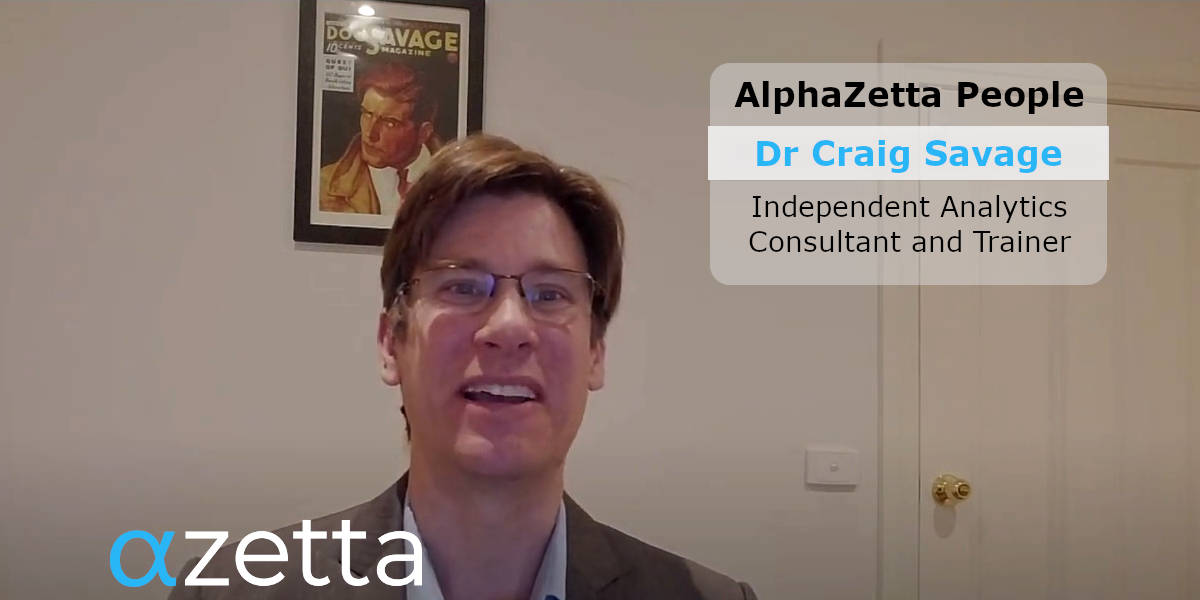Dr Eugene Dubossarsky is Managing Partner AlphaZetta Academy & AlphaZetta’s Chief Data Scientist
Segment duration: 11 min, 06 sec
Date recorded: 28 Feb 2020
Transcript
Leon: How important is data for business now?
Eugene: Data is crucial to some businesses, obviously so, but very important to others but they probably don’t realise it. But it depends how broadly we define data. If we’re talking about data the way I think of it, we’re talking about using all available data to make the best decisions. In that respect data is and has always been crucial.
If you say ‘but I’m fine with using instinct, experience and gut feel to make decisions’, I’d say they’re great, but they’d be even better using magical technologies of logic and reason and more recent computational technologies and the enhanement of readily available data to make those decisions even better.
Some people might say ‘I don’t really need to make ‘good’ decisions all that much’. That I think is the great tragedy today because for a lot of businesses, particularly those investing in data analytics, they’re not necessarily the businesses where good decisions are as crucial or bad decisions as calamatous.
But the other question to ask is: how important is data, not today, but tomorrow? I’d say increasingly and massively. Safer to say in ten years time it will be crucial.
I don’t need to convince you when I say anyone contributing any value to business today is massively computer literate compared to the average worker 30 years ago. The next wave, something that hasn’t really happened yet, but is coming, is the advent of data literacy.
Business professionals are going to need know how to be proficient at making decisions with data; how to turn data into decisions, how to infer insights from data, how to be curious with data and self-serving with data in ways that they currently are not.
A lot of the potential, productivity and value of the advanced analytics tools and the experts that we have in the field is being held back by the lack of data literacy on the part of most professionals and most leaders today.
Leon: How do business professionals obtain data literacy?
Eugene: Well, they could do my 2 day course, which is a very good place to start, but honestly, they need to engage with data analytics for the purpose of making decisions with data.
There’s 2 purposes for data: one is boring, it’s transactional and automated and happens in the background to facilitate online activities such as shopping and banking. The other, more exciting purpose for data is using it to making better decisions.
A manager (or anybody) seeking to become more data literate should start looking at data itself, realising their lack of skill in looking at data in an interactive and curious way, looking for opportunities and threats and then turning those into business actions.
Leon: Is hiring data scientists the right way to go to combat this lack of skill?
Eugene: Starting with hiring these very, very competent people may not be the best first step when you don’t know how to tell if they are good or not, when you don’t know how to assess their work, when you don’t what to do with their work or how to direct them.
Engaging with data to the best of one’s ability is the key first step, then learn and identify what you can’t answer. Next, get expertise in on an ad-hoc basis because people don’t know what questions to ask initially or what data resources they have or how they may help.
People who want to get into data analytics in a serious way need to spend a lot of time honestly exploring, very honestly saying ‘look I don’t even know where to start’. Very honestly accepting the fact that they are going to hit a lot of dead ends. They need to be willing to face all of that in a truly agile way (the English meaning of the word, not the new brand, but possibly aligned with the intentions of that brand), because people need to be able to engage directly with this task of making better decisions and learning and growing towards it.
The way I see that not being done is managers saying ‘well, here’s a bunch of budget, here’s a bunch of words that tell everyone how supportive and enthusiastic I am, but I’m not actually involved, this data stuff doesn’t concern me. ‘ Which makes me scratch my head, isn’t a CEO supposed to make good decisions for an organisation? Don’t they need to make good decisions?
Leon: So, the key for CEOs and managers is to engage with data and say ‘ this is how much I don’t know and this how much I have to learn’ ?
Eugene: That’s right, but engage also means start looking at data to the best of your ability. Do what Wintson Churchill did. My favourite data enabled manager was Winston Churchill during World War II. He engaged with data by having his statistical team in the next bunker and obtaining graphs and statistics from them and asking questions of them to help inform his decisions in the war.
Leon: that’s quite extraordinary. So it has to start with basic data, just go over that to the best of your ability?
Eugene: Have questions, examine the data, identify what you can’t answer and then learn. And yes, doing courses, getting smart people and advisors to help you do some of that interpretation, not all of it, and knowing at what point no-one can help you and you have to make the decision yourself. Knowing at what point you have to engage. Not outsourcing the whole decision pipeline to someone else just because it is ‘technical’. Which incidentally, is a term of abuse in Australia: technical means low status. Technical is a term that management often uses to dismiss very important complex thinking. So don’t do that.
Leon: well that’s a huge lesson for managers.





